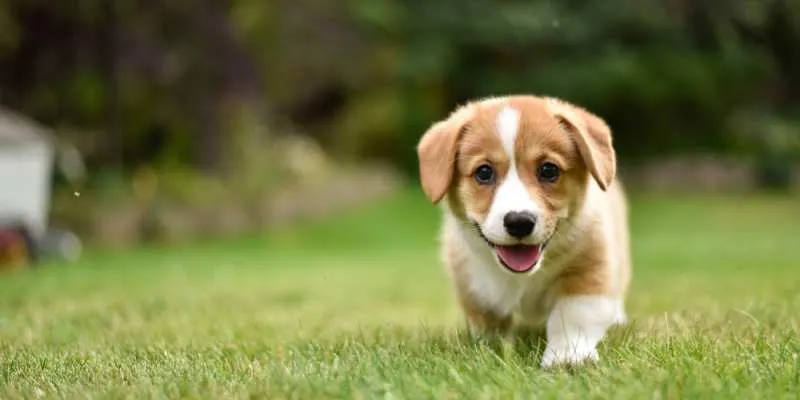Having a Corgi is a fun time for many reasons. But the thing that tops every single list that we manage to think of is their charming demeanor! They run around with a little hop; they jump around the house like cute furballs. It’s amazing.
So with all the exciting movement, you might have noticed, have you ever caught your Corgi shaking? We’re not talking about them dancing to your favorite tune (though that would be fun). What we mean is actual shaking, something like a tremor or quiver. Well, if you did, there’s a good chance that you got kind of worried.
This phenomenon can look cute, but it can be a bit scary. We all know that shaking and quivering usually doesn’t bring good news, at least as far as humans go – so what about dogs? Why do Corgis Shake?
Don’t worry; we did some research, and we’re here to set your mind at ease. So let’s figure this thing out!

Why Do Corgis Shake?
There are a lot of reasons for your Corgi to start shaking. It’s never out of the blue, though, and while it’s not normal, it doesn’t always mean it’s bad! Dogs, in general, can start shaking out of excitement or fear.
It’s a natural response when you think about it. When we humans suffer some sort of trauma, there’s a high chance that we’ll start shaking as a kind of response. Laughing out loud might not do the same thing to us, so why is it that your puppy shakes when the situation gets exciting?
Well, it has to do with its anatomy. The primary and natural response to the excitement for any dog is to wag its tail. Even the breeds that have just a short little bump for a tail wag it when something great is happening to them.
But the thing is, the more that dog gets excited, the more that movement will get transferred to the rest of the body. Some breeds have trouble walking when they get extremely excited! It sounds strange, and there’s nothing wrong with them when they do this; they’re just so darn happy!
So are Corgis one of these breeds?
Well, we’ll answer your question with another question. Have you met your Corgi? They are one of the most exciting little rascals around! Not every dog is the same; we’ll give them that. There surely are Corgis out there that are just a bit more calm and steady when faced with excitement.
But as a whole, you’re going to see a lot of shaking if you plan on having Corgis around. So you better get prepared for it.
It’s important to know when the shaking is harmless and when it’s a sign of fear, anxiety, or a health issue. This is all part of a sort of crash course that you need to go through when owning a puppy. There are times when they’ll get sick, and you need to know how to spot it.

The list for Corgi-shaking goes like this:
- Excitement
- Cold weather
- Anxiety
- Growing old
- Anticipation
- Health issues
All of these can happen at pretty much any age, except, of course, the growing old part. If your puppy randomly starts watching the golf channel, you’ll have a whole different problem on your hands. But we digress.
Let’s get the list going and teach you how to spot any sort of problem in your Corgi. Nobody expects you to become a dog whisperer here; let’s get that straight. But you should generally know how to read your dog. So no pressure; it’s all about looking at your dog and recognizing a certain behavior.
Knowing how your dog moves, in general, makes it much easier to spot when they might be experiencing any sort of physical discomfort. Dogs usually act differently when they’re in pain, they won’t say it, but they will show it. So always keep your eyes peeled for any changes in movement or behavior.

Now, let’s get this list started:
Excitement
We mentioned this one already, but let’s elaborate on what it really means. When dogs get excited, they have a physical reaction to it. Their tails start to wag from left to right, and their little booties can sometimes follow in the same direction.
You can especially see this in breeds like Staffords or Pitbulls. They may have a dangerous reputation, but these are some excited dogs, let us tell you. Their talks sometimes wag so much that they’ll start twisting their bodies to try and compensate. It’s adorable!
Now, Corgis usually don’t react this hard to happy thoughts. They are easily excited dogs, don’t get us wrong, but they’re also quite small. Think about it, if the dog is smaller, there’s bound to be less movement, especially when compared to larger breeds.
Nevertheless, tail wagging can sometimes be accompanied by shaking. It’s nothing you should worry about, and as long as it makes sense for your Corgi to get excited in a certain situation, it’s nothing to worry about.
Even though it’s perfectly normal for your dog to get excited, too much excitement can be problematic. Especially if your Corgi goes from 0 to 100 quickly. Meaning that if your dog is lying depressed for hours but then gets extremely excited in a moment – it’s time to call your vet.
Your Corgi Could Be Cold
While it is true that Corgi adapts well to pretty much all weather conditions, they still get cold during the winter! Corgis are little shepherds. They are an old breed that is over 3000 years old. In all those years, they managed to survive in all four seasons just fine. Their double coats keep them warm in winter, and they manage to keep their bodies cool during the summer.
That’s the reputation that they have, and let’s give them credit – it’s we; deserved. But all this doesn’t mean that your Corgi can’t get cold during a relatively cold winter. The thing is that they, especially when young, actually tended to adapt to the winters in order to know what kind of coat to grow out.
This means that the first winter will be extremely cold for them until they learn how much fur they need to grow out for the next one. So don’t be surprised if your young Corgi starts shaking during its first winter.
Don’t get surprised if they get cold later in life, either! Sure, they have those double coats, but sometimes they just get cold – everybody does, after all. If you notice that your Corgi is not reacting well to the winter outside, limit the amount of time you spend on walks so it can adapt enough.

Anxiety
This is the first serious issue on the list that you need to know about. Dogs can get anxious for many reasons depending on the surroundings that they grew up around.
The common type of it is separation anxiety. This is usually spotted in dogs that are adopted since they have trouble adapting to the fact that they were, at some point, left by somebody. It’s terrible, we know, but it’s not the only way for it to happen.
Corgi can generally get quite attached to their owners. They don’t have a problem with this any more than other breeds have, but it is something to consider.
The way to figure out whether or not your Corgi has separation issues is simple. It’s perfectly normal for a dog to get sad when its owner leaves. They just can’t conceptualize that you’ve gone out to get something from the store, and as far as they’re concerned, you might never come back.
It’s dramatic, we admit, but it’s how their mind works. After a while, though, dogs get used to the idea that you’re going to be gone for a while and that you’re coming back. They become more and more independent, and after a while, they start playing around on their own when you’re gone.
But if it seems that this behavior isn’t stopping, or even slowing down, then it’s time to face the facts. A dog that is suffering from separation anxiety will get into destructive behavior when you’re gone. They’ll tear through shoes, socks, furniture, and anything else they can get their paws on.
The real trouble begins when they start harming themselves. You should definitely consult with your vet at the beginning of the destructive pattern, as it usually means that it probably won’t slow down and that there’s a bigger problem underneath.
One of the signs that you can easily catch that will tell you that your dog is getting anxious about you leaving is, you guessed it, shaking! Dogs will generally start shaking when they’re anxious.
But the thing is that separation is not the only reason for your dog to feel this way. Corgis can get anxious around new dogs, in unfamiliar situations or places, etc.
The best way to figure out that your dog is anxious is the fact that their tail will most likely be between their legs. That shows you that one of the main emotions that are running the show at the moment is fear.
Old Age
The next possible reason for your Corg shaking is it growing old. Now, we know what you’re thinking – should dogs shake just because they’re old?
The answer to that question is NO; they shouldn’t. But many medical conditions will make your Corgis body shark once it reaches a certain age. Arthritis is one of the most common ones, for instance. But it’s not just that. Older dogs tend to shake more in situations that we already mentioned.
Older dogs just don’t have the same control over their body as they once had. For this reason, they can start to shake when they get excited or scared. This kind of shaking is a bit slower and usually not as aggressive as it would be with younger puppies.
You should still contact your vet if your veteran Corgi starts shaking for no reason. Just because they’re older doesn’t mean that it’s okay for them just to start shaking out of the blue!

Anticipation Of Daily Events
And we’re back to the fun stuff! This may sound strange, but your Corgi can sometimes get excited when they figure out that something good is about to happen. It’s similar to them anticipating you leaving the house, but it’s connected more to the good memories.
They can start shaking if they figure out that they’re about to go for a walk or if they know that it’s feeding time! This kind of shaking is the same kind you’ll encounter when they’re excited. As a matter of fact, they are excited; it’s just that they’re anticipating something before it happens.
So how can they figure out that something great is waiting for them?
Well, it’s a force of habit! They have a sort of biological cock inside of them. They can remember when food is about to come or when they’re about to go for a walk. It’s usually not something complex, but hey, it’s still impressive.
Health Issues
The last subject that we need to cover on this list is health problems. We won’t pinpoint something specific, as shaking can be a sign of many health issues. But we will point to the fact that it can rarely be the only symptom of something serious.
When it comes to medical problems, shaking is usually accompanied by panting, difficulty breathing, diarrhea, and many more symptoms.
But you might have noticed that only two of those four little legs start to shake from time to time. So why do Corgis’ back legs shake?
Well, there are multiple possible reasons. The most common one is that they’re just tired! If your Corgi was running like crazy for long periods, there’s a chance that the muscles on its back legs are stiff and sore.
This results in them shaking here and there! As long as it stops in a day or two, you have nothing to worry about. It’s important to contact your vet immediately if you can’t seem to find a logical explanation as to why your dog might be shaking!

Final Words
So there we have it! We’ve reached the end of the list. Shaking, as we mentioned, can be a playful reaction to something that your Corgi likes. It can be problematic as well, but as you must have gathered from the list yourself, shaking’s usually on the fun side.
No two dogs are the same, though, so even if you have two Corgis, one of them could be a shaking machine while the other just kind of stands there wagging its tail. There are no rules, is what we’re saying.
All in all, keep your eye out for any of the things from this list, and the short-legged furball will be just fine!

